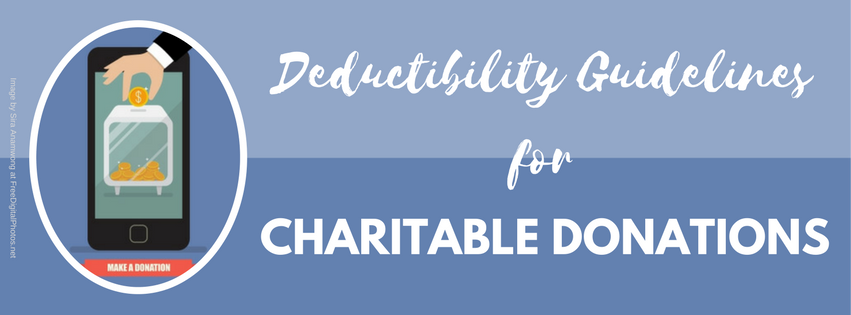Do you enjoy making donations to charities and having the benefit of a tax write-off for your contribution? It’s important to understand the tax provisions that apply to these donations, especially contributions of clothing, household items, and monetary giving.
Rules for Clothing and Household Items
Clothing and household items must generally be in good condition including furniture, furnishings, electronics, appliances, and linens.
Guidelines for Monetary Donations
A taxpayer must have a bank record or a written communication from the charity showing the name of the charity and the date and amount of the contribution. Bank records include canceled checks, bank, and credit card statements which should show the name of the charity, the date, and the amount paid.
Donations of money include those made in cash or by check, electronic funds transfer, credit card and payroll deduction. For payroll deductions, the taxpayer should retain a pay stub, a Form W-2 wage statement or other document furnished by the employer showing the total amount withheld for charity, along with the pledge card showing the name of the charity.
These requirements for the deduction of monetary donations do not change the long-standing requirement that a taxpayer obtain an acknowledgment from a charity for each deductible donation (either money or property) of $250 or more. However, one statement containing all of the required information may meet both requirements.
Contributions are deductible in the year made. Thus, donations charged to a credit card before the end of this year count for that year even if the credit card bill isn’t paid until later. If checks are postmarked by December 31, they still qualify for the deduction as well.
Make sure when you are making a donation that it is to an IRS approved charity. To verify if the organization is a qualified one, search the IRS website for the Exempt Organization Select Check. Churches, synagogues, temples, mosques, and government agencies are eligible to receive deductible donations, even if they are not listed in the database.
For all donations of goods, ask the charity for a receipt that includes their name, date of the contribution, and a reasonably-detailed description of the donated items. If a donation is left at a charity’s unattended drop site, keep a written record of the donation that includes this information, as well as the fair market value of the property at the time of the donation and the method used to determine that value. Additional rules apply for a contribution of $250 or more.
If you donate a motor vehicle, boat or airplane, it is usually limited to the gross proceeds from its sale. This rule applies if the claimed value is more than $500. Form 1098-C, or a similar statement, must be provided to the donor by the organization and attached to the donor’s tax return.
A properly-completed Form 8283 must be submitted with the tax return if the amount of a taxpayer’s deduction for all non-cash contributions is over $500.
It’s important to keep good records and receipts for all donations in the case of an audit and you need to prove the validity of your deductions..
Unfortunately, if you have volunteered with a not-for-profit organization, your time is not considered deductible on your return. However, you can get a write-off for miles driven for the charity, if applicable.
If you have any questions on how this deduction will affect your income tax, speak to your CPA who can help guide you when planning for if/when you make a donation, especially if it is one of high value.
